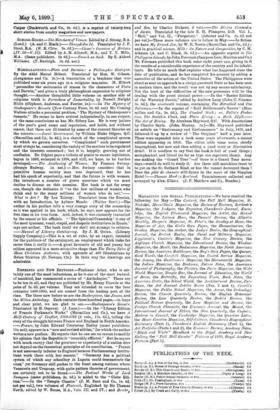- 11DitenmixDous.—Plata and Darwin: a Philosophic Dialogue. By. the Abbe Memel
Hebert. Translated by Hon. W. Gibson. (Longmans and Co. 2s.)—A translation of a brochure that was published some six years ago in a religious magazine. M. Hebert "personifies the antinomies of reason in the characters of Plato and Darwin," and gives a truly philosophical expression to religious thought—Another thoughtful little volume on another side of religious truth is Foretokens of Immortality, by Nowell Dwight Hillis (Oliphant, Anderson. and Ferrier, ls.)—In The Mystery of Shakespeare's Sonnets (New Century Press, 3s. 60. net) Mr. Cuming Walters attacks a perennial problem, "The Mystery of Shakespeare's Sonnets." He seems to have arrived independently, in one respect, at the same conclusions as has Mr. Sidney Lee. He is very jealous of the poet's good name and reputation, and holds, not without reason, that these are ill-treated by some of the current theories on the sonnets.—Local Government, by William Blake Odgers, Q.C. (Macmillan and Co., 3s. 60.), is a sketch of the complicated system by which we govern ourselves. "Complicated" such government must always be, considering the variety of the matters to be regulated and the interests concerned ; but, it is, happily, growing out of confusion. Dr. Odgers pays a tribute of praise to recent legislation, begun in 1888, enlarged in 1894, and still, we hope, to be further developed.-- The Awakening of Women. By Frances Swiney. (George Redway. 5s. net.) — Mrs. Swiney considers that in primitive human society man was depressed, that he has had his epoch of superiority, and that the future is with woman. She introduces a number of grave questions which we must decline to discuss on this occasion. Her book is not for every one, though she dedicates it "to the few millions of women who think and to the many millions of women who do not."— What is Art ? By Leo Tolstoy. Translated from the Russian with an Introduction, by Aylmer Maude. (Walter Scott.)—The author in his preface tells a very strange story of the censorship as it was applied to his book, which, he says, now appears for the first time in its true form. And, indeed, it was Curiously travestied by the censor or his officials. "The Spiritual Censorship' is one of the most ignorant, venal, stupid, and despotic institutions in Russia," says our author. The book itself we shall not attempt to criticise. —Manual of Library Cataloguing. By J. H. Quinn.. (Library Supply Company.)—This is a set of rules, by an expert, intended for the guidance of the cataloguer, an employment which looks far easier than it really is.—A great favourite of old and young has seldom appeared in a more attractive shape than The Fairy Tales tjf Hans Christian Andersen, with upwards of 400 Illustrations by Helen Stratton (G. Newnes, 12s.) In their way the drawings are admirable.






































 Previous page
Previous page